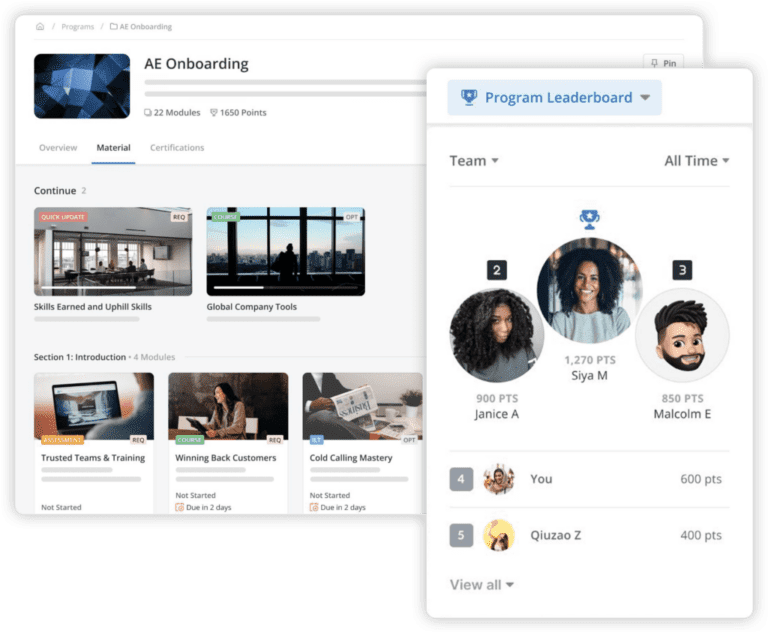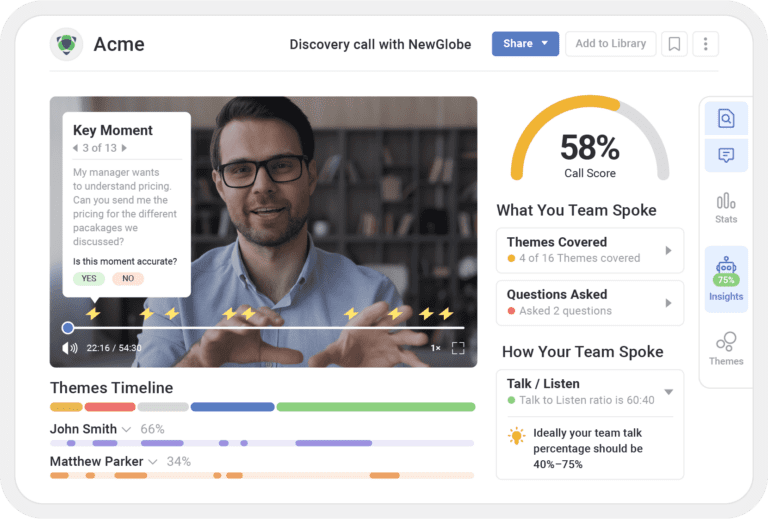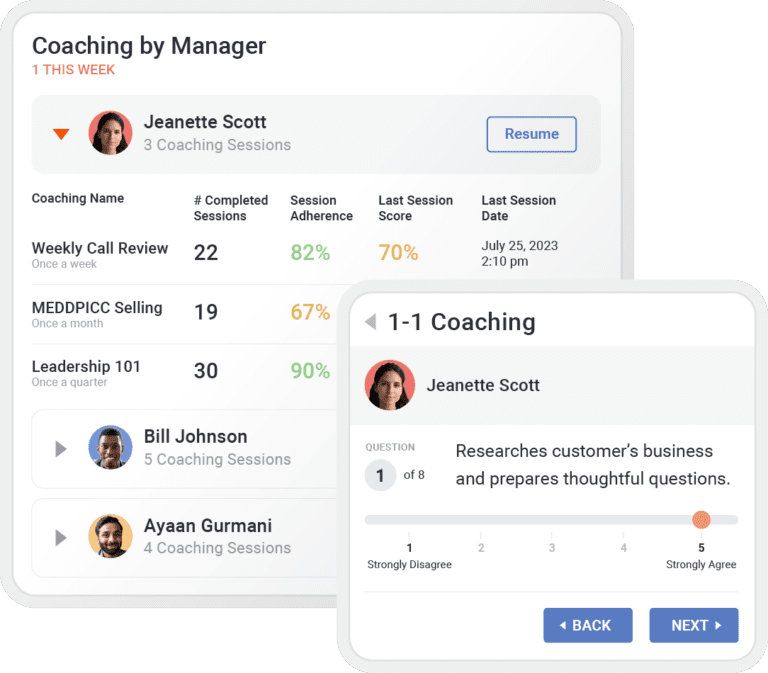When huge business shifts occur, companies sink or swim. Heightened customer expectations and larger buying teams have led to an onslaught of software products that simplify processes and focus on customer experiences.
Organizations that embrace these changes and adopt technology — in other words, set forth on a path to digital transformation — will find themselves well-positioned to beat out their competition and win over customers. Yet many shy away from taking on such an initiative, thinking it’s impossible to achieve given the current size of their sales team and available resources.
But it doesn’t have to be. Implementing technology and collaborating with employees makes digital transformation possible. And it often begins with your sales team. Keep reading to learn more.
What is digital transformation?
You see the term “digital transformation” everywhere, but what does it actually mean? Organizations committed to digital transformation adopt and integrate new technologies that reshape business, process, and culture models; automate certain processes; and, as a result, improve customer experiences. Spreadsheets and paper documents no longer support complex buying cycles — technology is necessary in today’s business environment.
IDC estimates that global spending on digital transformation is expected to hit $3.4 trillion by 2026.
According to IDC, global spending on digital transformation will hit
Orgs are investing in projects to modernize their infrastructures with AI, machine learning, and customer experience technologies. Digital transformation initiatives are often led by the CEO, CIO, and other senior leadership, but for them to work successfully, it requires involvement across departments.
What role does sales play in digital transformation?
Digital transformation impacts all functions of the business, but none more than sales. Sales teams have historically been a buyer’s first impression of your company. Now, buyers are doing plenty of research before ever speaking to a salesperson: visiting your website, viewing your content, and browsing your products (as well as those of your competitors).
According to Gartner, 78% of buyers prefer a rep-free sales experience, so they must have the technology and tools to maximize impact during that time. it’s also critical for sellers to make the most of these tools.
Still, salespeople have the most insight into the customer journey and should play a pivotal role in digital transformation efforts. They understand your products and services’ unique value and the best ways to communicate that to buyers. They also understand your company’s strengths and weaknesses and its daily operations. And finally, they understand how technology is essential to help employees do their jobs and create a far more pleasant experience for potential and existing customers.
Gartner reports that customers are 40% more likely to buy from sellers who tailor content to their needs — but sellers can only do this if their organization’s digital transformation has armed them with the tools and insights needed to personalize engagement.
Transforming your sales team with tech
Successful digital sales transformation fuels growth across the organization and goes beyond the blanket deployment of new technologies. A focus on automation, measurability, and how to make your sellers’ lives easier is what should guide your transformation efforts.
Data & insights
Data is at the heart of any digital transformation. The right technology provides insights into rep performance, from training engagement to content usage and time to close. These metrics help sales leadership personnel easily recognize where sellers are having success and where there are opportunities to improve.
Individualized training
Leveraging these insights, you can develop individualized learning activities for every seller. But leaders still struggle to identify gaps. According to our 2024-2025 Chief Revenue Officer + Sales Leader Outlook Report, only 40% of leaders can identify rep strengths and weaknesses for customized sales rep training.
Only
Digitally transformed sales enablement teams leverage tools that allow for customized training and hands-on learning activities automatically assigned to reps based on performance metrics — and add a level of competition with scored learning and leaderboards.

Follow up with field insights
Digitally transformed sales organizations also leverage technology that helps them ensure sellers are applying what they’ve learned during real customer interactions. Conversation intelligence goes beyond high-level performance metrics for sales leaders to gain visibility into real-world rep behaviors. From recordings and transcripts to AI-powered insights like sentiment, questions asked and answered, and more, you can pinpoint where every rep succeeds and where they fall flat when speaking to buyers — and you can arm sellers with tools to further the buying cycle.


For example, in analyzing our customer data, we found that, on average, sellers using Mindtickle share seven calls externally monthly. This is an example of how sellers in a digitally transformed salesforce can leverage conversation intelligence to elevate a prospect’s buying experiences: it enables the seller to share the transcript and recording of the call with their champion, who, in turn, is armed with the resources they need to socialize the information with their own internal stakeholders. It also makes sellers less focused on note-taking during sales conversations and more present and focused on what the prospect says.
Tailor coaching
Based on the strengths and weaknesses you’ve identified through data, conversation intelligence, and training, you’ll be armed with the information you need to design unique coaching experiences for every seller on your team. While over 80% of sellers report being coached on open deals, only 24% report being coached on long-term skills. But to effectively sell in a digital world, reps must be coached on skills ranging from systems and processes to written communications.


If individualized coaching seems like a lot of work, that’s because it can be — if you do it manually. Fortunately, leading revenue productivity platforms deliver the tools front-line leaders need to automatically schedule and launch coaching sessions and provide analytics to maximize the impact of coaching over the long term.
Critical skills for digital transformation
For your digital transformation to be successful, leadership must demonstrate certain skills, including the following:
Be transparent with employees throughout the entire planning and implementation process.
Gather input from various employees and work together to determine the best solutions for your business needs.
Create a transformation plan you feel passionate about and will dedicate yourself to over the weeks and months ahead.
Recognize that the process won’t go as planned and that you’ll have to adapt as circumstances change.
Ensure you take proper steps toward your goals regularly — daily, weekly, monthly, or quarterly.
Use the best platform for sales, support, and commercial transformation
Don’t view digital transformation as an obstacle to your success — think of it as an opportunity to better equip teams and gain a competitive advantage.
Mindtickle is an all-in-one platform to aid you in your digital sales transformation. Our revenue productivity tools automate tedious manual efforts for sales teams, managers, marketing departments, sales enablement people, customer success personnel, and more. With Mindtickle, you can build customizable programs with unparalleled flexibility, align these programs with your industry and business needs, and gain deep insights into program performance.
Drive digital transformation with Mindtickle
With professional services to integrate all the tools you need in one centralized platform, Mindtickle is what you need to get your revenue teams ready for anything.
Get a Personalized DemoThis post was originally published in April 2022 and was updated in March 2024.







